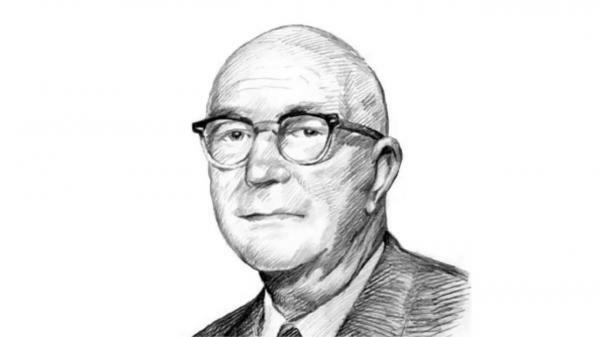
Gordon Allport was born in Montezuma, Indiana in 1897 and was the youngest of four siblings. He was a shy and studious boy, albeit a bit of a joker. He lived a lonely childhood. His father was a country doctor and as expected Gordon grew up among patients and nurses and all the paraphernalia of a miniature hospital. It is clear that everyone worked hard to get ahead. On the other hand, his life was uneventful and unsurprising. In this PsychologyOnline article, we will talk about the life and work of a great influence on Personality Theories in Psychology: Gordon Allport.
Index
- Gordon Allport Biography
- Gordon Allport Theory
- The propium
- Traits or Dispositions
- Psychological maturity
- Functional autonomy
- Conclusions
Gordon Allport Biography.
One of Allport's stories is always mentioned in his biographies: at 22 years of age, he traveled to Vienna. He had managed to meet the great Sigmund Freud! When she got to his office, Freud simply settled into an armchair and waited for Gordon to start. After a while, Gordon could no longer bear the silence and blurted out an observation he had made while he was on his way to meet Freud. He mentioned that he had seen a little boy on the bus who was very angry that he had not sat where an older woman had previously. Gordon thought that this attitude was something that the boy had somehow learned from his mother, a woman with a very elegant type and one of those who seem dominant. Freud, instead of taking the comment as a simple observation, took it as an expression of a deeper, unconscious process in Gordon's mind and said: "And that child was you?"
This experience made Gordon realize that deep psychology dug too deep; in the same way that he had previously realized that behaviorism was too much on the surface.
Allport he received his bachelor's degree in psychology in 1922 at Harvard, following in the footsteps of his older brother Floyd, who would become a leading social psychologist. Gordon always worked on developing his theory, examining social issues like prejudice and creating personality tests. He died in Cambridge, Massachusetts in 1967.
Gordon Allport Theory.
One of the things that motivates humans is the tendency to satisfy biological survival needs, which Allport calls opportunistic functioning. He points out that this functioning is characterized by its reactivity, orientation to the past and of course, it has a biological connotation.
But Allport believed that opportunistic functioning was relatively unimportant to understanding most human behavior. Most human behaviors, he said, are motivated by something quite different - functioning as an expressive form of the self - which he called own operation- proprium- Most of the things we do in life are… a matter of being who we are! Self-functioning is characterized by its tendency to activity, its orientation to the future, and it is psychological.
The Latin word proprium is the basis for the term Allport chose after reviewing hundreds of definitions to call in a more scientific way that popular but essential concept known as Self. In any case, for better or for worse, the new term never caught on.
To get closer to what has been called proprium functioning more intuitively, think about the last time you wanted to act in a different way. certain form or being in a concrete way because I truly felt that these acts would be a direct expression of what is most important in yourself. Remember, for example, the last time you did something to express yourself; that time where he said "this is who I really am!" Do those things that are consistent with who we are; this is proper operation (In this sense, and for practical purposes, we can perfectly use the term as "own". N.T.)
The propium.
Since Allport put so much emphasis on the Self or Proprium, he had to be as precise as possible with the definition of it. He did it from two directions, phenomenologically and functionally.
First, from a phenomenological perspective, it would be the Self as something that is experienced, that is felt. Allport suggested that the Self is composed of those aspects of experience that we perceive as essential (something opposite to incidental or accidental), warm (or "dear", as opposed to emotionally cold) and central (as opposed to peripheral).
The functional definition of it became a developmental theory of its own. The Self has 7 functions, which tend to arise at certain moments in life:
- Body sensation
- Own identity
- Self esteem
- Self extension
- Self Image
- Rational adaptation
- Effort or own struggle (Propriate)
The Body sensation it develops in the first two years of life. We have a body, we feel its closeness and warmth. It has its own limits that alert us to its existence through pain and injury, touch or movement. Allport demonstrated a demonstration in this aspect of the Self: imagine that we spit into a glass and... then we drink it! What's happening; where is the problem? It's certainly the same thing we swallow every day! But, of course, it has come from within our body and has become something strange, and therefore, alien to us.
The Own Identity (of the Self; of oneself) it also develops in the first two years of life. There is a moment in our life where we consider ourselves as continuous entities; as possessors of a past, a present and a future. We see ourselves as individual entities, separate and differentiated from others. Notice we even have a name! Will you be the same person when you wake up tomorrow? Yes of course. Of course, we assume this question.
The Self esteem develops between two and four years of age. There also comes a time when we recognize ourselves as valuable beings for others and for ourselves. This circumstance is closely linked to the continuous development of our skills. For Allport, this really is Anal Stadium!
The Extension of the self (extension of the Self) develops between four and six years of age. Some things, people and events around us also become central and warm; essential to our existence. "Mine" is something very close to "My" ("I"). Some people define themselves by virtue of their parents, wives or children; from your clan, gang, community, institution or nation. Others find their identity in an activity: I am a psychologist, a student or a worker. Some in one place: my home, my city. Why is it that when my child does something wrong, I feel guilty? If someone scratches my car, why does it feel like it was done to me?
The Self image (self image) it also develops between the ages of four and six. This would be "the reflection of me"; the one that others see. This would be the impression I project on others, my "type", my social esteem or status, including my sexual identity. It is the beginning of consciousness; of the Ideal Self and of the "person".
The Rational adaptation it is learned predominantly between the ages of six and twelve. The child begins to develop his abilities to deal with life problems rationally and effectively. This concept would be analogous to Erickson's "industry" or "industry."
The Effort or Own fight it usually does not start until after the age of twelve. It would be the expression of my Self in terms of goals, ideals, plans, vocations, demands, sense of direction or purpose. The culmination of one's own struggle would be, according to Allport, the ability to say that I am the owner of my life; the owner and operator.
(We cannot avoid the observation that the evolutionary periods that Allport uses are very close to the developmental periods that Freud uses in his own stages! But, it is important that we specify that Allport's scheme is not a theory of evolutionary stages; it's just a description of the way people generally develop.)

Traits or Dispositions.
Now, since Proprium develops in this way, then we will also develop personal traits or personal dispositions. At first, Allport used the term traits, but found that people understood the concept as when someone describes another person or when we conclude the personality by virtue of some personality tests, instead of considering it those unique, individual characteristics of the person. Finally, he changed the concept to provisions.
A personal disposition is defined as "a generalized neuropsychological structure (peculiar to the individual), with the ability to interpret and handle many functionally equivalent stimuli, and to initiate and guide consistent (equivalent) forms with adaptive behavior and stylistic".
A personal disposition produces equivalences in function and meaning between various perceptions, beliefs, feelings and actions that are not necessarily equivalent to the natural world or the mind of any other. A person with the personal disposition "fear of communism" can include Russians, liberals, teachers, strikers, social activists, environmentalists, feminists and so on. This person would "put everyone in the same bag" and respond to any of them with a group of behaviors that express their fear: making speeches, writing complaint letters, voting, arming, becoming enraged, etc.
Another way of saying it would be that the dispositions are concrete, easily recognizable and consistent in our behavior.
Allport defends that traits are essentially unique to each person. One person's "fear of communism" is not the same as another's. And we truly cannot hope to believe that knowing other people will help us understand the first time. For this reason, Allport makes a strong case for what he calls ideographic methods (methods that are focus on the study of a single individual through interviews, analysis of letters or diaries, and the rest. We currently know this method as qualitative.
Still, Allport recognizes that within any particular culture, there are common traits or provisions; some that are part of that culture and that anyone would recognize and name. In our culture, we often differentiate introverts from extraverts or between liberals and conservatives, and we all know (roughly) what we mean. But another culture might not recognize it. For example, what would liberal and conservative mean in the Middle Ages?
The author also defends that some traits are much more tied to proprium (one's own self) than others. The central features They are the cornerstone of your personality. When we describe someone, we will often use words that refer to the following core features: ready, silly, wild, shy, gossipy… Gordon has observed that most people have between five and ten of these traits.
There are also so-called secondary traits, those that are not so obvious or so general, or so consistent. Preferences, attitudes, situational traits, are all secondary. For example, "he gets angry when you try to tickle him"; "That one has very unusual sexual preferences"; or "this one cannot be taken to restaurants."
But there are also the cardinal features. These are the traits that some people have that practically define their lives. He who, for example, spends his whole life seeking fame or fortune, or sex, is one of those. We often use specific historical figures to name these cardinal traits: Scrooge (the typical miser - character from Dickens's book of "A Christmas Story" N.T.); Joan of Arc (heroic and sacrificed); Mother Teresa (religious service); Marquis de Sade (sadism); Machiavelli (Machiavellian, political cruelty) and so on. Relatively few people develop a cardinal trait, and if they do, it is quite late in life.
Psychological maturity.
If you have a well-developed proprium and a rich, adaptive set of dispositions, you've achieved psychological maturity, Allport's term for mental health. It establishes seven characteristics:
- Extensions of the Self specific and lasting as the commitment.
- Techniques bond warmly, oriented towards dependence on others (trust, empathy, sincerity, tolerance ...)
- Emotional security and self-acceptance.
- Habits towards a realistic perception (contrary to defensiveness)
- Focus on problems and development of skills focused on problem solving.
- Objectification of the Self or what is the same, develop introspection; laugh at yourself, etc.
- A unified philosophy of life, which includes a particular orientation towards valuation; differentiated religious feelings and a personal conscience.

Functional autonomy.
Allport did not believe in looking to the past as a way of understanding a person's present. This belief has its greatest evidence in the concept of functional autonomy: your current motives are independent (autonomous) of their origins. It doesn't matter, for example, why you wanted to become a doctor or why you developed a predilection for olives or spicy sex; the point is, that's the way you are now!
Functional autonomy is presented in two ways: the first is the persevering functional autonomy. It refers essentially to habits (behaviors that no longer serve their original purposes, but are still maintained) For example, You could have started smoking as a symbol of adolescent rebellion, but now you can't quit because you just can't! leave him! Social rituals like "Jesus or health" when someone sneezes was right for her at one time (during the plague, and sneezing was by far a more serious sign than it is today!), but it still continues today because it has to do with a way of education.
The appropriate functional autonomy it is more self-directed than habits. Values are the most common example. Maybe you were punished for being selfish when you were little. This action in no way detracted you from being a great generous currently; rather, it became a value to you!
You can probably see by now that Allport's idea of functional autonomy may have been derived from the frustration of this one with Freud (or with the behaviorists) Of course this could be interpreted as a defensive belief on the part of Allport.
The idea of functional autonomy (values) led Allport and her followers Vernon and Lindzey to develop a category of values (in a book called A Study of Values (A study of Values), 1960, and to a Test of values (test):
- The Theorist - a scientist, for example, values the truth.
- The Economic - a businessman would value utility.
- The Aesthetic - an artist naturally values beauty.
- The Social - a nurse might have a strong love for people.
- The politician -- a politician would value power.
- The Religious - a monk or nun probably values unity.
Of course most of us have several of these values in a more moderate way and we would even value some of these rather as negative. There are more modern tests that are used to help children find their career profile that have similar dimensions.
Conclusions.
Allport is one of those theorists who were so right about so many things, that his ideas have simply become part of the human spirit through the ages. His theory is one of the first humanistic theories that would influence so many others like Kelly, Maslow, and Rogers.
An unfortunate aspect of his theory is his original use of the word trait, which led to many situation-oriented behaviorists will reduce their true meaning, making them more open. But, this has always been a weakness of psychology in general and in personality in particular: ignorance of the past and the theories and investigations of others. (We could add here that personality traits are also accompanied by imprints not only biological, but educational, so it is important to take into account all the constituent factors of person. N.T.)
This article is merely informative, in Psychology-Online we do not have the power to make a diagnosis or recommend a treatment. We invite you to go to a psychologist to treat your particular case.
If you want to read more articles similar to Personality Theories in Psychology: Gordon Allport, we recommend that you enter our category of Personality.
References
- Allport's most significant books are Pattern and Growth in Personality (1965), The Person in Psychology (1968), and The Nature of Prejudice (1954). He was a very good writer and none of these books are too technical.


